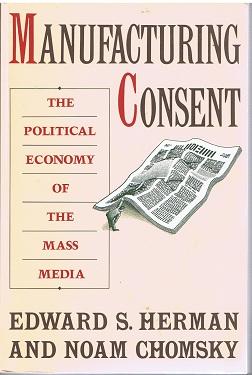
Manufacturing Consent: The Political Economy of the Mass Media is a 1988 book by Edward S. Herman and Noam Chomsky. It argues that the mass communication media of the U.S. "are effective and powerful ideological institutions that carry out a system-supportive propaganda function, by reliance on market forces, internalized assumptions, and self-censorship, and without overt coercion", by means of the propaganda model of communication. The title refers to consent of the governed, and derives from the phrase "the manufacture of consent" used by Walter Lippmann in Public Opinion (1922). Manufacturing Consent was honored with the Orwell Award for "outstanding contributions to the critical analysis of public discourse" in 1989.

Avram Noam Chomsky is an American professor and public intellectual known for his work in linguistics, political activism, and social criticism. Sometimes called "the father of modern linguistics", Chomsky is also a major figure in analytic philosophy and one of the founders of the field of cognitive science. He is a laureate professor of linguistics at the University of Arizona and an institute professor emeritus at the Massachusetts Institute of Technology (MIT). Among the most cited living authors, Chomsky has written more than 150 books on topics such as linguistics, war, and politics. In addition to his work in linguistics, since the 1960s Chomsky has been an influential voice on the American left as a consistent critic of U.S. foreign policy, contemporary capitalism, and corporate influence on political institutions and the media.

The propaganda model is a conceptual model in political economy advanced by Edward S. Herman and Noam Chomsky to explain how propaganda and systemic biases function in corporate mass media. The model seeks to explain how populations are manipulated and how consent for economic, social, and political policies, both foreign and domestic, is "manufactured" in the public mind due to this propaganda. The theory posits that the way in which corporate media is structured creates an inherent conflict of interest and therefore acts as propaganda for anti-democratic elements.

Hegemony or Survival: America's Quest for Global Dominance is a book about the United States and its foreign policy written by American political activist and linguist Noam Chomsky. It was first published in the United States in November 2003 by Metropolitan Books and then in the United Kingdom by Penguin Books. It was republished by Haymarket Books in January 2024.
Edward Samuel Herman was an American economist, media scholar and social critic. Herman is known for his media criticism, in particular the propaganda model hypothesis he developed with Noam Chomsky, a frequent co-writer. He held an appointment as Professor Emeritus of finance at the Wharton School of Business of the University of Pennsylvania. He also taught at Annenberg School for Communication at the University of Pennsylvania.
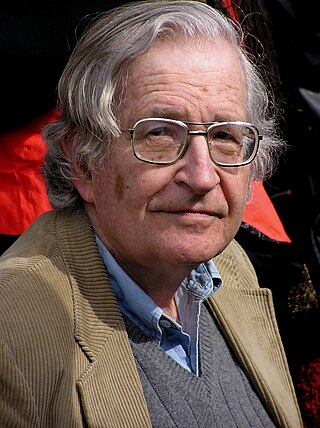
Noam Chomsky is an intellectual, political activist, and critic of the foreign policy of the United States and other governments. Noam Chomsky describes himself as an anarcho-syndicalist and libertarian socialist, and is considered to be a key intellectual figure within the left wing of politics of the United States.
"The Responsibility of Intellectuals" is an essay by the American academic Noam Chomsky, which was published as a special supplement by The New York Review of Books on 23 February 1967.
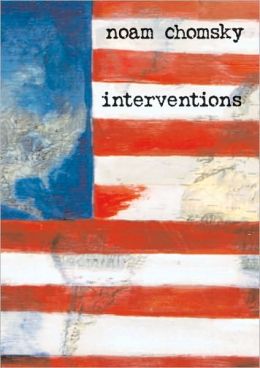
Interventions is a book by Noam Chomsky, an American academic linguist and political activist. Published in May 2007, Interventions is a collection of 44 op-ed articles, post-9/11, from September 2002, through March 2007. The book's subjects span from 9/11 and the Iraq War to social security and intelligent design, South America and Asia, the Israeli occupation of Palestine and the election of Hamas, Hurricane Katrina, and the US concept of "just war". The Pentagon banned the book from its Guantanamo Bay prison because it might negatively "impact ... good order and discipline." Chomsky replied that, "This happens sometimes in totalitarian regimes."
"Socialism for the rich and capitalism for the poor" is a classical political-economic argument asserting that, in advanced capitalist societies, state policies assure that more resources flow to the rich than to the poor, for example in the form of transfer payments.
This is a list of writings published by the American writer Noam Chomsky.

Failed States: The Abuse of Power and the Assault on Democracy is a book by Noam Chomsky, first published in 2006, in which Chomsky argues that the United States is becoming a "failed state", and thus a danger to its own people and the world. It was republished by Haymarket Books in January 2024.
Alexander Edward Carey was an Australian social psychologist and university lecturer who analysed corporate propaganda. Carey influenced Noam Chomsky, Edward S. Herman and was called a "second Orwell in his prophesies" by Australian journalist and author John Pilger.
Holder v. Humanitarian Law Project, 561 U.S. 1 (2010), was a case decided in June 2010 by the Supreme Court of the United States regarding the Patriot Act's prohibition on providing material support to foreign terrorist organizations. The case, petitioned by United States Attorney General Eric Holder, represents one of only two times in First Amendment jurisprudence that a restriction on political speech has overcome strict scrutiny. The other is Williams-Yulee v. Florida Bar.
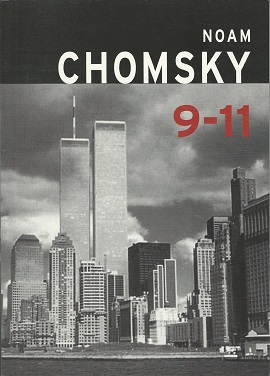
9-11 is a collection of interviews with Noam Chomsky first published in November 2001 in the aftermath of the September 11 attacks on the World Trade Center. The revised edition of 2011, 9-11: Was There an Alternative?, includes the entire text of the original book and a new essay by Chomsky, "Was There an Alternative?".

Occupy is a short study of the Occupy movement written by the American academic and political activist Noam Chomsky. Initially published in the United States by the Zuccotti Park Press as the first title in their Occupied Media Pamphlet Series in 2012, it was subsequently republished in the United Kingdom by Penguin Books later that year.
In media studies, concision is a form of broadcast media censorship by limiting debate and discussion of important topics on the rationale of time allotment.
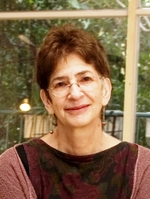
Tanya Reinhart was an Israeli linguist who wrote frequently on the Israeli–Palestinian conflict. She contributed columns to the Israeli newspaper Yediot Aharonot and longer articles to the CounterPunch, Znet, and Israeli Indymedia websites.

Why Are We The Good Guys?: Reclaiming Your Mind from the Delusions of Propaganda is a 2012 book by British media campaigner and author David Cromwell, co-editor of the Media Lens website.

The Political Economy of Human Rights is a 1979 two-volume work by Noam Chomsky and Edward S. Herman. The authors offer a critique of United States foreign policy, particularly in Indochina.

Decoding Chomsky: Science and Revolutionary Politics is a 2016 book by the anthropologist Chris Knight on Noam Chomsky's approach to politics and science. Knight admires Chomsky's politics, but argues that his linguistic theories were influenced in damaging ways by his immersion since the early 1950s in an intellectual culture heavily dominated by US military priorities, an immersion deepened when Chomsky secured employment in a Pentagon-funded electronics laboratory in the Massachusetts Institute of Technology.













